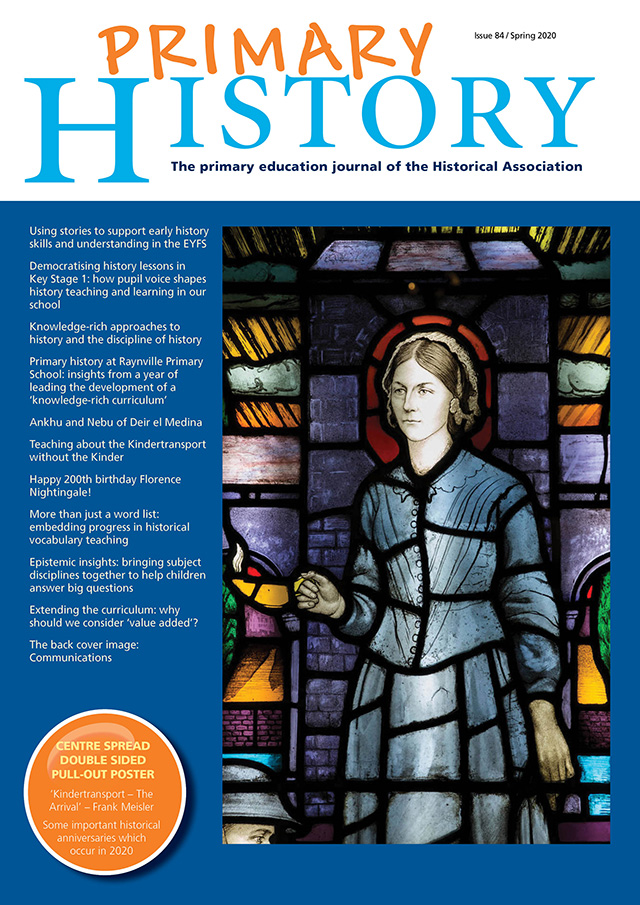Primary History 84: out now
HA journal news

Editorial
Welcome to Primary History 84. I’ve really enjoyed editing this edition. It has been exciting to work with people who share a love of history and who engage with history teaching and learning in so many different ways. I have been impressed with the passion and dedication which our authors convey through their articles, and hope that you too will be inspired when you read them.
A hot topic in education at the moment is schools’ curriculum provision. There has been much recent discussion surrounding this in light of initiatives currently influencing primary practice. Under the new Ofsted framework (2019), when making judgements about the quality of education, Ofsted will consider the ‘substance’ of what is taught, through curriculum intent, implementation and impact.
Every primary school I have ever had the privilege of working in, or with, regularly reviews its curriculum to ensure it meets the needs of pupils, and we should celebrate all the good practice already happening in our primary schools. It should also be noted that Ofsted do not expect schools to rewrite their curriculum. Ofsted too acknowledge primary schools already using their whole curriculum as a way to promote quality of education for children. That said, whether it be part of a school’s regular curriculum review, or perhaps prompted by Ofsted’s current focus on schools having a broad and well-balanced curriculum, it is true to say that many primary schools are in the process of revisiting their history provision.
A number of these schools are adopting a ‘knowledge-rich approach’ and there is much in this edition to stimulate discussion around this. Adopting a knowledge-rich approach to teaching history is not straightforward. Matthew Sossick’s article identifies important considerations which should be made when planning for history teaching and learning in order that teachers can secure rich subject knowledge without compromising the integrity of history as a discipline.
Following Matthew’s article, Robbie Burns shares his experience of leading the development of a knowledge-rich history curriculum in his school and explains the rationale behind choices made in relation to this. Aligning well with this is Ailsa Fidler’s article which considers how to develop pupils’ knowledge, understanding, and use of historical vocabulary in a meaningful way.
In his second article for this edition, Matthew Sossick writes about epistemic insights. Matthew considers how subjects can be brought together to help children answer big questions while still maintaining the integrity of each subject discipline. As he says in his article, with Ofsted’s new Education Inspection Framework looking at the intent behind curriculum design it is very timely to consider what we teach and how we will teach it.
Also in this edition, Karin Doull explores ways in which schools can extend their history curriculum, and the importance of doing so. Karin shares some exciting ways in which this can be achieved. Stuart Boydell’s article places children at the centre of the history curriculum and considers how the meaningful use of pupil voice can shape their learning and secure good progress. Stuart shares his experience of implementing this approach in Key Stage 1 and identifies some useful strategies for teachers to use. Sandra Kirkland chooses three well known, and much loved, children’s books and illustrates how stories such as these can be used with young children to develop early history skills and understanding in the EYFS.
As we approach the 200th anniversary of Florence Nightingale’s birth, Melissa Chatton from the Florence Nightingale Museum in London celebrates Florence’s bicentenary by reflecting on her legacy and sharing three favourite artefacts, chosen to represent Florence’s significance. As well as providing an insight into Florence Nightingale’s life, the article and accompanying images provide inspiration for some super learning in Key Stage 1 or perhaps a whole school assembly to mark the anniversary. Happy 200th birthday Florence!
Alf Wilkinson’s article supports teaching of the achievements of the earliest civilisations in Key Stage 2, with a focus on Ancient Egypt. Alf writes about Ankhu and Nebu, from the Ancient Egyptian village of Deir el Medina, home to craftsmen and skilled workers who built and decorated royal tombs. It’s a fascinating exploration of aspects of their life, and Alf considers how we might support children in developing a sense of period through learning about the lives of different people.
Karen Van Coevorden considers the poignant question of how can we continue to teach about the Kindertransport when, as each year passes, fewer of those who were rescued on it are able to share their stories first-hand with us. This edition’s poster is a useful resource to support teaching activities suggested in this article.
I hope you enjoy this edition of Primary History and its diverse range of interesting, useful and thought-provoking articles. If you are interested in contributing to a future edition, please do contact us with your ideas. We’d love to hear from you!
Damienne Clarke is a senior lecturer in primary history and professional studies at Birmingham City University, co-secretary of the Midlands History Forum and a member of the HA Primary History editorial board

